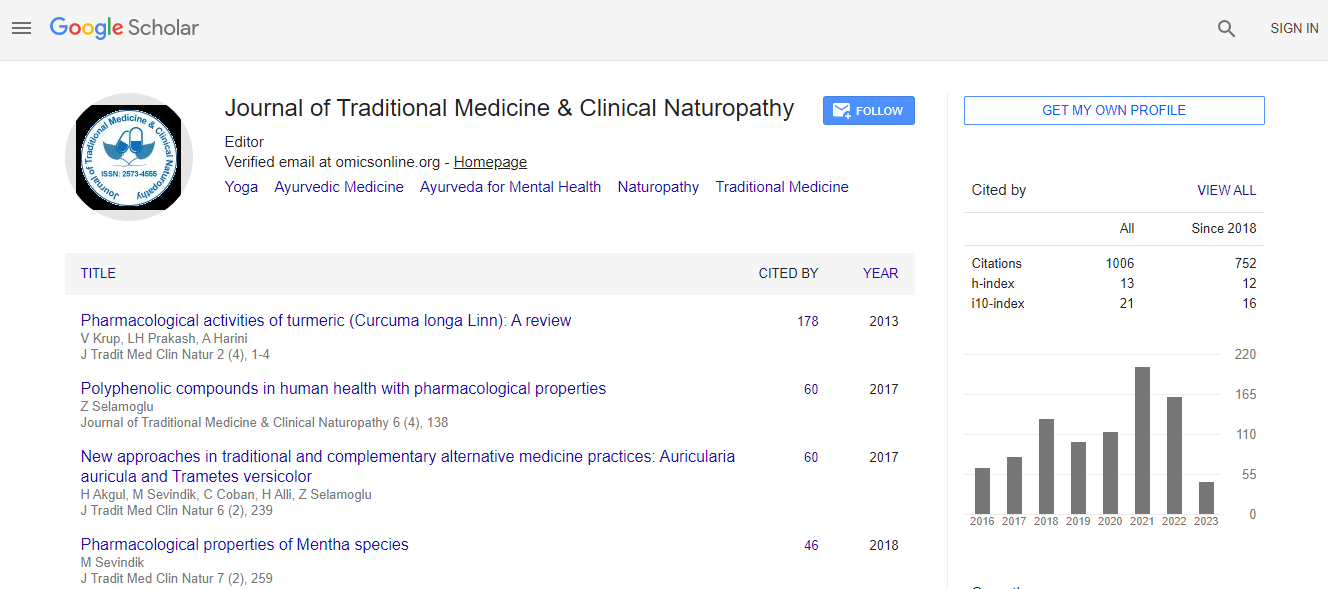Research Article
Perceptions and Use of Medicinal Herbs among College Students at a Jordanian University in Amman-Jordan: Traditions Supersedes Education
Abdelmalek SMA*, Alkhawaja B and Darwish DA
Department of Pharmacology and Biomedical Sciences, University of Petra, Amman, Jordan
- *Corresponding Author:
- Abdelmalek SMA
Department of Pharmacology and Biomedical Sciences
The Faculty of Pharmacy and Medical Sciences, University of Petra
Amman, Jordan
Tel: 00962-795511248
E-mail: sabdelmalek@uop.edu.jo
Received date: August 26, 2016; Accepted date: September 07, 2016; Published date: September 13, 2016
Citation: Abdelmalek SMA, Alkhawaja B, Darwish DA (2016) Perceptions and Use of Medicinal Herbs among College Students at a Jordanian University in Amman-Jordan: Traditions Supersedes Education. J Tradi Med Clin Natur 5:191.
Copyright: © 2016 Abdelmalek SMA, et al. This is an open-access article distributed under the terms of the Creative Commons Attribution License, which permits unrestricted use, distribution, and reproduction in any medium, provided the original author and source are credited.
Abstract
Herbs serve as valuable remedies in many cultures. They offer an alternative to increasingly ineffective drugs. This study assesses the perceptions and determinants of medicinal herbs use among students at University of Petra, Amman, Jordan. A cross-sectional study involving randomly selected students from pharmacy and non-pharmacy specialties is conducted based on self-administered questionnaire. The sample involved 350 students (168 pharmacy and 182 nonpharmacy students). Medicinal herbs use as an alternative to medication is reported by 80% of pharmacy and 65% of non-pharmacy students. Sixty three percent of all students prefer using medicinal herbs over visiting a physician, as it is perceived easier and safer by 63% and 35% of pharmacy and 65% and 30% of non-pharmacy students, respectively. Lack of medical insurance significantly encouraged herbal use (p<0.001). Major sources of information on medicinal herbs use included family as reported by 71% of non-pharmacy and university education (53%) as reported by pharmacy students, however, 33% of pharmacy students reported family to be their major source of information of which 76% of them were second year students who were not yet exposed to education about herbs. Wrong choice and preparation of herbs are noted in 91% of non-pharmacy and 63% of pharmacy students. Abdominal pain is the primary reason for using medicinal herbs as reported by 98% and 87% of non-pharmacy and pharmacy students, respectively. Followed by upper respiratory tract infections (URTI), reported by 11% of pharmacy and 2% of non-pharmacy students. One per cent of pharmacy students who were in their fourth year mentioned diabetes and hypercholesterolemia as ailments that can be treated by herbs. None of the participants chose depression, insomnia, headache or migraine as an indication for which medicinal herbs can be used. The use of medicinal herbs among students is prevalent. It is primarily influenced by culture, however, further guidance to avoid faults in herbal choice and preparation is demanded.

 Spanish
Spanish  Chinese
Chinese  Russian
Russian  German
German  French
French  Japanese
Japanese  Portuguese
Portuguese  Hindi
Hindi 
